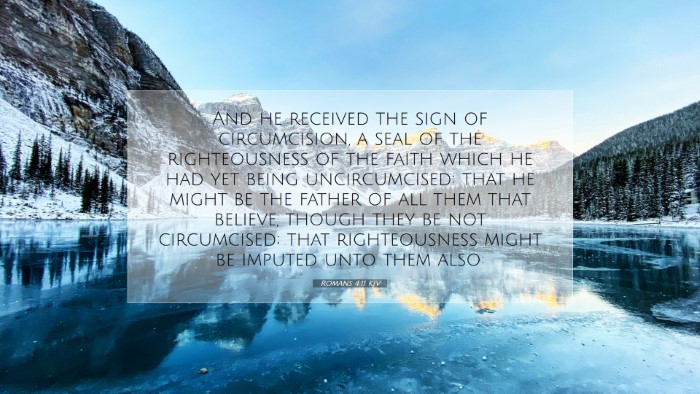Old Testament
Genesis Exodus Leviticus Numbers Deuteronomy Joshua Judges Ruth 1 Samuel 2 Samuel 1 Kings 2 Kings 1 Chronicles 2 Chronicles Ezra Nehemiah Esther Job Psalms Proverbs Ecclesiastes Song of Solomon Isaiah Jeremiah Lamentations Ezekiel Daniel Hosea Joel Amos Obadiah Jonah Micah Nahum Habakkuk Zephaniah Haggai Zechariah MalachiRomans 4:11
Romans 4:11 KJV
And he received the sign of circumcision, a seal of the righteousness of the faith which he had yet being uncircumcised: that he might be the father of all them that believe, though they be not circumcised; that righteousness might be imputed unto them also:
Romans 4:11 Bible Commentary
Commentary on Romans 4:11
Romans 4:11 states:
"And he received the sign of circumcision, a seal of the righteousness of the faith which he had yet being uncircumcised: that he might be the father of all them that believe, though they be not circumcised; that righteousness might be imputed unto them also."
Context and Overview
This verse occurs within a broader argument that the Apostle Paul is making concerning faith and righteousness. In Romans chapter 4, Paul uses Abraham as a prime example of faith in God's promises, emphasizing that righteousness is credited not based on works or adherence to the law, but through faith.
Key Themes in Romans 4:11
- The Sign of Circumcision: Circumcision was a physical sign of the covenant God made with Abraham, which signified not just obedience to the law but also a deeper spiritual commitment.
- Seal of Righteousness: The apostle refers to circumcision as a ‘seal’ of the righteousness Abraham already possessed by faith. This indicates that outward signs or ceremonies do not effectuate faith, but rather confirm it.
- Universal Fatherhood: Paul highlights that Abraham’s faith makes him the father of all believers, Gentiles included. This points towards the inclusivity of the Gospel.
- Imputed Righteousness: The concept that righteousness can be attributed to those who believe is foundational in Pauline theology and crucial for understanding salvation.
Insights from Matthew Henry
Matthew Henry emphasizes the significance of the covenant sign given to Abraham. He notes that circumcision followed Abraham's faith and is described as a seal — it confirmed what God had already done in Abraham’s heart. Henry asserts that the act of circumcision does not create faith but is a testimony to the faith Abraham already possessed.
Furthermore, Henry articulates that Paul’s argument in this passage centers around the idea that the blessings of Abraham extend beyond the Jewish people to encompass all who share in his faith. He makes a strong case that the promise of justification by faith alone is a crucial tenet of Christian doctrine.
Insights from Albert Barnes
Albert Barnes provides detailed theological reflection on the word "seal." He points out that a seal is meant to authenticate a document or covenant, indicating that circumcision serves as an outward testimony to the inward reality of faith in God’s promises.
Moreover, Barnes underscores the radical nature of Paul’s claims regarding righteousness being attributed to those who are not circumcised. He explains that this statement was revolutionary in a Jewish context, as it proclaimed that Gentiles could share in the same grace as the Israelites without adhering to the law of Moses.
Insights from Adam Clarke
Adam Clarke examines the sociocultural implications of circumcision and its role in the life of Abraham. He points out that while Abraham was circumcised, it was his faith that justified him initially—suggesting a priority of faith over law. Clarke elaborates on how this positional righteousness embraces faith as the primary instrument through which believers relate to God.
Clarke also remarks on the significance of Abraham being described as the father of all who believe, indicating a shared heritage among believers that transcends ethnic boundaries. This universality of faith provides a poignant reminder of God’s grace available to all mankind.
Theological Implications
The implications of Romans 4:11 are profound for both individual and corporate understanding of faith and grace:
- Faith as the Foundation: Righteousness is based on one's faith rather than adherence to religious rituals, a principle that remains crucial in contemporary Christian teaching.
- Inclusion of Gentiles: The radical notion of Gentiles being included in God’s covenant family continues to challenge the church to embrace diversity and inclusivity.
- The Nature of Salvation: Understanding righteousness as imputed rather than earned lays the groundwork for Christian soteriology, paving the way for discussions on grace, works, and assurance of salvation.
Conclusion
Romans 4:11 stands as a cornerstone for understanding the interplay between faith, works, and the nature of God’s covenant promises. Through the exploration of insights from esteemed commentaries, we grasp the depth of Paul’s message about Abraham and the significance of faith as the means of grace. This revelation provides assurance for believers and encourages a shared identity in Christ that transcends cultural and ethnic boundaries.


